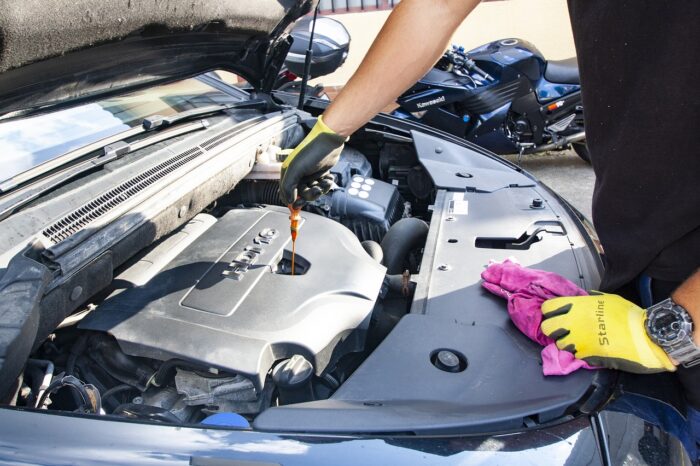Engine knock is a common problem in older vehicles, especially when the engine is not maintained correctly. Knocks are common in engines that are poorly lubricated. However, engine knock can also be caused by too much oil in the engine. How so?
Too much oil can cause the engine to overheat. This, in turn, will cause the pistons and rods to misalign, which will cause the engine to knock.
The best way to tell if your vehicle is knocking due to excess oil or other factors is to take it to a mechanic and have them run diagnostics on the vehicle’s computer system to determine the reason.
This article will be dealing with the following questions: Can overfilling oil cause engine knock? What happens when there is too much oil in Engine?Can too much oil cause engine knock? Can too much oil cause knocking? Engine ran without oil now knocking, what next? Will too much oil cause engine knock?
If any of these questions are of serious concern to you, then this article will provide a help for you.
To go more in-depth with the problem at hand let’s start with a brief overview of how an engine works and how an engine knocks.
When the piston hits the air-fuel mixture, the air and fuel vaporize instantly. This rapid vaporization causes the pressure in the cylinder to increase rapidly.
The increased pressure forces the piston down, compressing the air-fuel mixture. This constant compression creates heat, which causes the oil in the engine to break down. The heated oil then releases vapor into the atmosphere of combustion.
The sound created is what we hear as engine knock.
So, if you’re noticing a knocking noise coming from your engine, there’s a good chance that too much oil is the cause if you see a lot of oil dripping onto the ground below your engine when the motor is running.
This is a good indicator that you have too much oil in your vehicle. If your oil levels are regularly low but your engine oil is still dirty and sludge-like in appearance, you’ll want to get your oil changed more frequently to make sure you’re getting rid of old oil and bringing in fresh new oil. Remember to change your car’s air filter, too.
How to prevent the engine from knocking
There are a few things you can do to help prevent your engine from knocking. and they include the following:
Use the right type of oil
A quality engine oil is essential for keeping your vehicle running smoothly. Make sure to use an oil that is specifically designed for your engine’s make and model.
Synthetic oils are a good option if you’re concerned about the environment. but they can also cause your engine to ping at high RPMs. Oils labeled as “synthetic blend” are good for most vehicles. but it’s best to check your owner’s manual to be sure.
Use good fuel
A good fuel in this context is one with a high octane number, translating to a high anti-knock property, which means that it burns cleaner and causes less wear on your engine. Some popular fuels that meet these qualifications are 91 octane and 97 octanes.
Keep a good oil level
If your engine oil is low, your car will struggle to turn over, and you’ll likely hear a knocking noise from the engine. A good rule of thumb is to check the dipstick every day and make sure the oil level is right in the middle; its also advisable to ensure that your engine is not overfilled or filled with too much oil, as this can lead to problems in the future such as breakdowns or even engine damage.
Routine maintenance
Having a good routine maintenance schedule for your vehicle will help ensure that worn-out parts are replaced at the right time.
Detailed Vehicle History gives you a rare opportunity to see the upcoming recommended maintenance services of your vehicle, download our mobile app today and enjoy unlimited maintenance services for your vehicle. Download our mobile app today and enjoy unlimited and free VIN decoding.
Conclusively Before buying a used car make sure to have a mechanic check it thoroughly and give it a thorough going over for any faults or wear that may have not been noticeable at the time it was first sold. It’s also highly recommended to obtain a car history report, as this can provide vital information about the vehicle’s past and help avoid any unexpected issues.”
Frequently Asked Questions
Yes, overfilling the oil in an engine can potentially cause engine knock. When there is too much oil, it can create excessive pressure inside the engine’s crankcase. This can lead to the oil foaming or aerating, reducing its lubrication properties. In turn, inadequate lubrication can cause metal components to rub against each other, resulting in engine knock or a knocking sound. we trust that the question “Can overfilling oil cause engine knock?” is now satisfactorily answered.
When there is too much oil in the engine, it can lead to several issues. The excessive oil level can cause the crankshaft to dip into the oil, creating excessive windage and drag. This can rob the engine of power and reduce fuel efficiency. Additionally, the foaming or aerating of the oil can lead to decreased lubrication efficiency, potentially causing engine knock and putting additional stress on engine components.
Yes, too much oil can cause engine knock as it can lead to poor lubrication and increased internal pressure within the engine.
If an engine has run without oil and is now experiencing knocking sounds, the damage to internal components may have already occurred. In such cases, it is essential to have the engine inspected by a qualified mechanic or automotive expert. The knocking sound is a clear indication of internal damage, and continued operation without addressing the issue can lead to further and potentially irreparable damage. Depending on the extent of the damage, repair or engine replacement might be necessary.
Yes, too much oil can lead to engine knock due to the negative effects it has on lubrication and internal pressure within the engine, as explained earlier.









